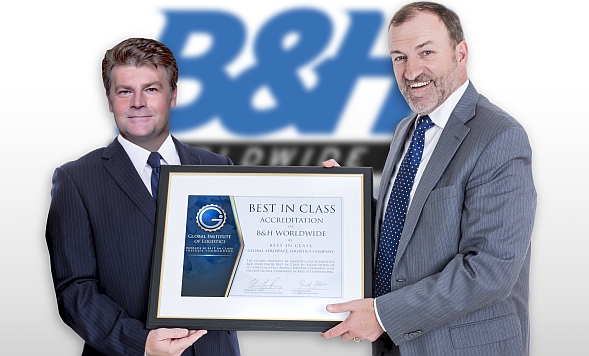2017
2017: AIT ACCREDITED BEST IN CLASS
CHICAGO USA-APRIL 2017
AIT WORLDWIDE LOGISTICS ACCREDITED ‘BEST IN CLASS’
Global Institute of Logistics Accredits AIT Worldwide Logistics Best in Class in recognition of the company’s culture which has been developed and formalized to prioritize relationship excellence as the core value and guiding principle in the company’s development.
AIT Worldwide Logistics, the Chicago USA based global independent freight forwarder has been accredited Best in Class by the Global Institute of Logistics. The designation Best in Class is reserved for those independent freight forwarders identified by the Institute as demonstrating a commitment to best practice in logistics execution.
The announcement is the result of the Institute’s ongoing research into the evolving role of the Independent Freight Forwarder in Global Logistics, which will be published in 2018. The research is in response to the increasing trend by Beneficial Cargo Owners (BCO’s) to outsource the management of their freight traffic, logistics, and supply chain support functions to the independent freight forwarding sector.
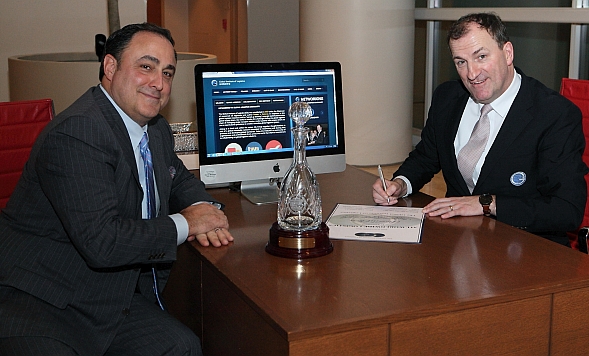
ACCREDITATION FROM KIERAN RING FOUNDER GLOBAL INSTITUTE OF LOGISTICS
AIT’s accreditation with Best in Class is in recognition of the company’s culture which has been developed and formalized to prioritize relationship excellence as the core value and guiding principle in the company’s development. AIT have embedded a commitment to excellence in the conduct of both internal and external relationships in their company culture and regard this principle as central to its strategic foundation.
AIT recognize that relationship excellence begins within the company and between co-workers and that the quality of interaction between team members will directly affect the company’s customer either positively or negatively.
The company’s commitment to relationship excellence is articulated in AIT’s mission, vision, and core values, statements which are foundational to the company culture. AIT has a very clear idea of why they are doing what they do (mission) where they are trying to go (vision) and how they are going to go about it (core values).
Mission, vision and core value statements can sound intangible and cryptic to the uninformed, but to visionaries like Vaughn Moore President $ CEO at AIT, their development is a vital step in building a strong foundation of consensus for the organization with core value behaviors outlined to be an AIT teammate.
The effect of AIT’s culture program has been to build consensus within the organization around the core principle of relationship excellence. This principle, in turn, influences the tools that AIT build and the services they deliver.
AIT is in effect putting theory into practice. Academics argue that excellence in the conduct of relationships is Best Practice 101 in logistics execution. Indeed, Institute research proves that there is a direct correlation between relationship excellence and the quality and costs of the logistics service delivered.
AIT’s culture provides a benchmark for the industry to emulate and crucially the essential ingredient that a Beneficial Cargo Owner (BCO) should look for when choosing its logistics partner.
Commenting on today’s announcement, Kieran Ring CEO at the Institute said
“AIT is known in the global logistics industry as the ‘One to Watch’ amongst global independent freight forwarders, and our research makes it very clear why. Everything that Vaughn Moore and his team do at AIT is meticulously planned and executed.
They say the higher the skyscraper, the deeper the foundation and AIT’s culture development program is just that, a foundation on which to build a global logistics company with real depth and reach. AIT realizes that competing on operational excellence alone, where they excel, will not get them to where they want to go. They need to have a competitive advantage, and in choosing relationship excellence and making it a core competence and guiding principle in the company’s development, AIT has chosen the most effective differentiator.
No other service is influenced as much by relationship excellence as logistics provision, once trust is established between colleagues, partners, and customers through sincerity, reliability and consistency, the hallmarks of relationship excellence, things get done, information gets shared, and freight moves faster. Vaughn Moore AIT’s President and CEO is the Chief Advocate for the company’s culture, he radiates charisma and genuinely relates to people excellently, he is not asking anybody at AIT to do anything that he does not do himself and at the end of the day that is what matters.
I am encouraged that at a time when there are many demands for capital, AIT has chosen to invest in its culture, great to see Vaughn and his team setting a global best in class standard, leading the way and ultimately providing a benchmark for others to emulate. Congratulations to all concerned.”
Vaughn Moore, President, and CEO of AIT Worldwide Logistics responding to the announcement said:
“AIT is honored to receive the Best-in-Class designation from a respected independent third party with such insightful knowledge of the transportation industry. We appreciate the acknowledgment from the Global Institute of Logistics, and I offer my thanks to all AIT team members for their individual contributions that have collectively helped us earn this recognition.
Our teammates all over the world are engaged in an ongoing effort to strengthen and evolve the company culture. Every day, the company’s Vision, Mission, and Core Values are expressed in our relationships with customers, partners, community members and each other. Those relationships drive the qualities for which AIT is known including our consultative approach, flexible solutions, competitive pricing and high performance.
While teammates at AIT continue to advance our vision of becoming the global logistics provider respected for delivering a world-class experience, we look forward to sharing our passion for culture by participating in the Institute’s forthcoming global benchmarking group.”
NOTES TO EDITORS
ABOUT AIT WORLDWIDE LOGISTICS:
Founded in 1979, Itasca, Illinois-based AIT Worldwide Logistics is a full-service transportation management provider. With continental headquarters in Chicago, Amsterdam and Hong Kong, AIT’s offices form a vast network spanning the globe. By coupling a flexible business model with robust technology that presents end-to-end shipment visibility, AIT delivers precisely tailored supply chain efficiencies for almost every industry imaginable. Leveraging creative, competitively priced multimodal solutions, AIT removes the complexity from global logistics puzzles, helping companies thrive by regaining focus on the core goals of their business.
For more information, visit http://www.aitworldwide.com
Our Mission
At AIT, we vigorously seek opportunities to earn our customers’ trust by delivering exceptional worldwide logistics solutions while passionately valuing our co-workers, partners and communities.
ABOUT GLOBAL INSTITUTE OF LOGISTICS
The Global Institute of Logistics (GIL) was established in 2003 under the Chairmanship of renowned US logistician and author Robert V. Delaney in response to the global logistics industry’s call for “joined up thinking” amongst stakeholders in the global supply chain. GIL looks to resolve the challenges facing the global logistics chain of managing single transport modes, modal systems, and targets which are set on stand-alone operations to create a seamless global logistics system.
Acting as a think tank within the sector, GIL brings together thought-leaders and thought-followers as part of a global knowledge network committed to building up the information base, best practices and standards needed. This, in turn, creates a platform through which knowledge is shared, best practice is adopted and trade developed. Today the Institute is a community of organizations and professionals from across the world that share a commitment to collaborating on global logistics solutions.
The Institute’s mission is to ‘Network the Global Logistics Community’
For further information, visit www.globeinst.org
For further information,
Contact the Institute’s Media Director:
mediadirector@globeinst.org
For AIT Contact Matt Sanders
msanders@aitworldwide.com
2017: ALG ACCREDITED BEST IN CLASS
LISBON, Portugal November 2017
AEROSPACE LOGISTICS GROUP ACCREDITED AS
GLOBAL BEST IN CLASS AEROSPACE FREIGHT FORWARDING NETWORK
The Global Institute of Logistics Accredits Aerospace Logistics Group ‘Global Best in Class Aerospace Freight Forwarding Network’
The Global Institute of Logistics has announced that the Aerospace Logistics Group has been accredited with Best-in-Class status, in recognition of the network’s outstanding contribution to the development of best practice in vertical specific freight forwarding networks (VSFFN)
The announcement of ALG’s accreditation as “Global Best in Class Aerospace Freight Forwarding Network” comes, as a result of, the Institute’s ongoing research on independent freight forwarding in global logistics.
ACCREDITATION FROM KIERAN RING FOUNDER GLOBAL INSTITUTE OF LOGISTICS
One of the significant early findings of the Institute’s research is the importance of networks. Network membership enables freight forwarders to form relationships with other freight forwarding companies, gain access to their resources and link with their activities, all critical in connecting beneficial cargo owners to international supply and distribution networks.
A key observation arising from our initial research is the existence of vertical-specific freight forwarding networks (VSFFN) which invites further examination and analyses of their specific role and value.
VSFFN are defined as freight forwarding networks which service specific industries, offering a tailored logistics solution which meets the requirements of that vertical. VSFFN are strategically managed collaborative networks, the members of which enjoy a higher level of communication, coordination, and control when compared with their generic counterparts. This greater degree of communication, coordination, and control is essential to provide tailored solutions for customers in niche verticals which demand higher service levels.
The aviation and aerospace industries are some of the most demanding verticals for suppliers of logistics and freight services. Demand is derived from three key drivers’; globalization, maintenance, repair and overhaul (MRO) and aircraft on the ground (AOG).
Globalization has fueled deregulation, and open skies agreements have made it possible for airlines to build global networks. This has led to increasing demand for freight and logistics services to match the lengthening supply chain.
The Maintenance, Repair, Overhaul (MRO) Market which includes the overhaul, repair, inspection or modification of an aircraft was valued at US$135.1 Billion in 2015, three-quarters of the US$180.3 Billion aircraft production market. The freight and logistics support needed to keep the MRO supply chain operating on target and on time is astounding and pushes logistics service providers to the pinnacle of performance.
The costs of an aircraft on the ground (AOG) is estimated to be $1 million per day, including passenger compensation which must be paid for delayed and canceled flights. Responding to these emergencies results in the ultimate demonstration of time-critical shipment ability and demands the highest levels of communication, coordination, and control in the logistics process to get aircraft back in the air.
Such is the level of complexity in aviation and aerospace MRO logistics support, the Institute chose the role of VSFFN in this vertical for special focus in the report on independent freight forwarding in global logistics.
CITATION
Having reviewed the development of networks in the vertical, the Institute chose the Aerospace Logistics Group as its benchmark and recipient of Global Best in Class Aerospace Freight Forwarding Network.
Founded ten years ago, ALG is the pioneer VSFFN in the aviation and aerospace industry. It has grown to become a global network of independent providers, who together have built up a unique and uniform offering to their customers drawing on their combined expertise.
The principal reasons for the Institute’s accreditation:
- The ALG network:
Are innovators in Aviation and Aerospace MRO logistics.
Is a trusted global network with local market knowledge.
Is comprised of dedicated members specifically chosen for their exceptional performance and customer service.
Demonstrate network standards which guarantee effective hands-on management.
Members demonstrate a commitment to relationships which over time leads to the development of interdependent activities, increasing the level of mutual productivity.
Relationships are founded on strong conviction and mutual commitment to excellent service when dealing with the handling of their client’s needs.
Members have developed personal relationships through informal daily contacts, and through formal network meetings, which in turn has generated ties that contribute to the creation of a sense of belonging and commitment to the network.
Members can provide the range of services demanded by the vertical and deliver them to an exacting and time-sensitive standard. This includes for example:
24 Hour Service
Specialist Handling Equipment
Tarmac/ Airside License Permit
Specialist Vehicles
Specialist Insurance
Specialist Customs Clearance services.
Access to Priority Scanning
On Board Courier Capability (visas)
Spare Parts in inventory
- The ALG network:
- Carries out an extensive verification process on the information and references submitted by new applicants, to assure that new companies can comply with the existing network profile.
Speaking in response to the announcement Roberto Colucci of World Cargo Italy and a founding member of the Aerospace Logistics Group said:
“I would like to thank the Global Institute of Logistics on behalf of the board and our members for bestowing the honor of Best in Class on our network. I know I speak for each member company when I say that we are truly passionate about what we do. We realize how fortunate we are to play the role we do in one of the world’s most exciting industries; we have worked tirelessly to stay ahead of our customer’s needs, we know that this is a truly global industry and we have developed our network in line with that.
We also appreciate that the aerospace/aviation industry is subject to the highest standards and expectations by its passenger base and that we as vendors, need to exceed expectations first time every time. We keep the world moving, and we will continue to do so. Best in Class accreditation encourages us to work harder, smarter to remain ahead and to continue to deserve this accolade. Thank You”.
Speaking at today’s Press Conference, Kieran Ring CEO and Founder of the Institute said:
“I am delighted to present Aerospace Logistics Group with its accreditation as ‘Global Best in Class Aerospace Freight Forwarding Network’, our research on vertical-specific freight forwarding networks enabled us to get an insight into different freight worlds. Freight worlds with unique demands and specific vertical requirements. No vertical is more demanding than the aerospace/aviation vertical where fright logistics is driven largely by the economy of speed.
In no other vertical have we witnessed the premium placed on velocity, airlines simply cannot afford to have aircraft on the ground for any longer than is humanly possible. This has led to some initiatives by airlines including pooling their resources, sharing spare part inventory, etc., however, no matter how optimized the spare part distribution network, the final mile still poses the greatest challenge. This is where the Aerospace Logistics Group and its members come in.
ALG members quite literally operate on a 24/7 basis reflecting the mission-critical nature of their work. KPI’s in this industry are measured in minutes, so much so that parts frequently travel accompanied by onboard couriers who are fully licensed, insured and security cleared to deliver parts directly to aircraft on the apron. Failure is not an option and to survive and thrive in this world dependability is the key.
Combine the agility needed to deliver mission-critical with the other challenges faced by ALG members including jet engine delivery and spare part logistics needed for the MRO process, and you begin to see that freight forwarder who specialize in this vertical are a different breed to their generic counterparts.
The Aerospace Logistics Group has done a great job in matching the global reach of their customer base with their worldwide footprint. In 10 years they have succeeded in building a global network of like-minded best of breed independent freight forwarders who are committed to meeting the exacting standards of both their peer group and their customer base. The network operates to stringent standards and mutual accountability, which underpins its entire operation.
Freight forwarders who wish to occupy a seat at this table know the ground rules, there is nowhere to hide, planes are waiting, people need to get home and every hour saved means $100,000 straight to the bottom line. There are no second chances and from what we can see ALG members don’t need them”.
NOTES TO EDITORS
ABOUT THE AEROSPACE LOGISTICS GROUP:
Aerospace Logistics Group was founded in January 2007 by a group of international freight forwarders. The ALG specializes in providing value-added services specifically meeting the needs of the aviation and aerospace industries. The Aerospace Logistics Group provides a high class, worldwide service – around the clock!
All members are independent companies with many years’ experience in the aerospace industry – joined together to provide seamless global coverage.
In the demanding aviation and aerospace industry, the requirements of our individual customers are wide-ranging and vary from AOG shipments, charters and couriers to routine sea and road freight. We are well placed to fulfill their needs, through the flexible and durable solutions made possible by our members combined global operations and wealth of experience.
It is through our unique set up, our high membership standards, and the combined expertise of our members around the globe that our customers can enjoy a continuity of service, on both a local and regional level, rarely offered by our competitors. We speak your language, with members who are experienced in the complex logistics of aerospace parts, both large and small. We appreciate the concepts of “just in time” and inventory reduction. We understand the difference between routine, critical and AOG – and only ship as AOG when it is truly needed, saving client’s time and money. And we know an FAA8130 from an EASA Form 1.
Our goal is to deliver an impeccable service with tailored procedures to ensure the fast and safe arrival of your freight.
Information on the Aerospace Logistics Group can be found HERE
ABOUT GLOBAL INSTITUTE OF LOGISTICS
The Global Institute of Logistics (GIL) was established in 2003 under the Chairmanship of renowned US logistician and author Robert V. Delaney in response to the global logistics industry’s call for “joined up thinking” amongst stakeholders in the global supply chain. GIL looks to resolve the challenges facing the global logistics chain of managing single transport modes, modal systems, and targets which are set on stand-alone operations to create a seamless global logistics system.
Acting as a think tank within the sector, GIL brings together thought-leaders and thought-followers as part of a global knowledge network committed to building up the information base, best practices and standards needed. This, in turn, creates a platform through which knowledge is shared, best practice is adopted and trade developed. Today the Institute is a community of organizations and professionals from across the world that share a commitment to collaborating on global logistics solutions.
The Institute’s mission is to ‘Network the Global Logistics Community’
For further information, visit www.globeinst.org
For further information,
Contact the Institute’s Media Director:
mediadirector@globeinst.org
For Aerospace Logistics Group
Steven Alves General Manager: admin@aerologgroup.com
2017: B&H WORLDWIDE ACCREDITED BEST IN CLASS
LONDON UNITED KINGDOM OCTOBER 2017
B&H WORLDWIDE ACCREDITED WITH ‘BEST-IN-CLASS’
The Global Institute of Logistics has today announced that B&H Worldwide has been accredited with Best-in-Class status, in recognition of the company’s outstanding contribution to the development of best practice in independent freight forwarding and logistics in the global aerospace vertical.
B&H Worldwide’s accreditation as Best-in-Class arises from the Institute’s ongoing research into the evolving role of the Independent Freight Forwarder in global logistics. The final report will be published in 2018. The research is a response to the growing trend of Beneficial Cargo Owners (BCO’s) outsourcing the management of their freight traffic, logistics, and supply chain support functions to the independent freight forwarding sector.
The report includes a module on the role of the independent freight forwarder in the global aerospace industry. The Institute has determined that B&H Worldwide is the benchmark independent freight forwarder in the sector. The research, coupled with peer group opinion, warrants this accreditation.
ACCREDITATION FROM KIERAN RING FOUNDER GLOBAL INSTITUTE OF LOGISTICS
Globalization has fueled deregulation and open skies agreements have made it possible for airlines to build global networks. This has led to increasing demand for freight and logistics services to match the lengthening supply chain.
The Maintenance, Repair, Overhaul (MRO) Market which includes the overhaul, repair, inspection or modification of an aircraft was valued at US$135.1 Billion in 2015, three-quarters of the US$180.3 Billion aircraft production market. The freight and logistics support needed to keep the MRO supply chain operating on target and on time is astounding and pushes logistics service providers to the pinnacle of performance.
The costs of an aircraft on the ground (AOG) is estimated to be $1 million per day, including passenger compensation which must be paid for delayed and canceled flights. Responding to these emergencies results in the ultimate demonstration of time-critical shipment ability and demands the highest levels of communication, coordination, and control in the logistics process to get aircraft back in the air.
Measured against all these drivers, the research found that B&H Worldwide operates and executes to logistics standards, in excess of what is considered the norm for the industry. The company, with 30 years of specialization in this vertical, has gained an edge over its competitors. This is a consequence of staying focused and continuing to innovate in line with the growing, exacting and changing demands in the industry.
B&H’s decision in 2014, to separate its IT development division from main operations by establishing wholly-owned technology business B&H InTech, has proven particularly astute. The Company’s best of breed solution, OnTrack has grown to become the operating platform of choice for many of the leading airlines and is regarded as the benchmark technology in end-to-end rotable transport management
InTech, when combined with the company’s full suite of products and services, has provided the framework through which B&H has developed its control tower logistics solution which is its 4PL model for the industry.
This is the ultimate in full-service logistics outsourcing, and best demonstrates the power of logistics to transform and optimize an airline’s supply chain. With its development of control tower solutions, B&H have proved worthy for accreditation as Best-in-Class. The Institute’s Report will include a case study on the development, implementation, and effectiveness of this programme in its final report.
An expansion of the case study will provide the core content for a workshop for the aerospace industry, to speed its adoption as best practice in the sector.
Speaking at today’s Press Conference, Stuart Allen, CEO, B&H Worldwide said:
“This accreditation is an exceptional honor. I am truly grateful to our employees around the world for their passion and ambition to exceed the standards of service in aerospace logistics and of course to all our customers who took part in the Institute’s research”.
“Being named the world’s Best-in-Class Global Aerospace Logistics Company endorses our uniqueness and confirms our belief in specializing solely in this sector. Our desire to be the best, rather than the biggest is borne out by this extraordinary, independent award”.
Speaking at today’s Press Conference, Kieran Ring CEO and Founder of the Institute said:
“I am delighted to present B&H Worldwide with its accreditation as Best-in-Class, I have worked very closely on the research which informed our decision, and I am in no doubt that in B&H Worldwide, the Institute has identified one of the world’s leading independent freight forwarders”.
“The story of the company’s development is inspiring and demonstrates that by adopting a customer first, market-aware approach, independent freight forwarders can, not only survive but thrive in the global marketplace”.
“B&H Worldwide is operating and executing to logistics standards beyond what is expected in the industry. A confluence of circumstances, driven by the demands of the aerospace industry and combined with 3 decades of hands-on experience in the vertical, has propelled the company to the top of the class, to Best-in-Class”.
“Having worked personally on the research into B&H, I’m drawn to using a medical metaphor to describe their approach. An AOG situation is the equivalent of a medical emergency and is best dealt with by the clinician with the most specialist knowledge in that field. That’s how B&H are regarded by their customers, more specialized than a general practitioner, skilled, timely and resolute in their approach, intuitively knowing what’s best while at the same time keeping a cool head. B&H are consultants in all but name”.
NOTES TO EDITORS
ABOUT BEST-IN-CLASS:
Best-in-Class accreditation from the Global Institute of Logistics is awarded to only one company in each vertical market in global freight forwarding. B&H Worldwide has further established its market-leading position by attaining this remarkable accomplishment.
ABOUT B&H WORLDWIDE:
Established in 1988 in the UK, B&H Worldwide is a market leader in the highly specialist aerospace logistics industry. Over the last 30 years, B&H has expanded globally and today operates from ten strategically positioned aerospace hubs around the world and has a customer base that includes airlines, spare part stockists, MROs, and repair vendors. Its innovative, in-house designed OnTrack software sets the benchmark for the aerospace logistics industry.
Information on B&H Worldwide’s leading logistics solutions can be found at www.bhworldwide.com
ABOUT GLOBAL INSTITUTE OF LOGISTICS
The Global Institute of Logistics (GIL) was established in 2003 under the Chairmanship of renowned US logistician and author Robert V. Delaney in response to the global logistics industry’s call for “joined up thinking” amongst stakeholders in the global supply chain. GIL looks to resolve the challenges facing the global logistics chain of managing single transport modes, modal systems, and targets which are set on stand-alone operations to create a seamless global logistics system.
Acting as a think tank within the sector, GIL brings together thought-leaders and thought-followers as part of a global knowledge network committed to building up the information base, best practices and standards needed. This, in turn, creates a platform through which knowledge is shared, best practice is adopted and trade developed. Today the Institute is a community of organizations and professionals from across the world that share a commitment to collaborating on global logistics solutions.
The Institute’s mission is to ‘Network the Global Logistics Community’
For further information, visit www.globeinst.org
For further information,
Contact the Institute’s Media Director:
mediadirector@globeinst.org
For B&H Contact Cathy Howe, Director. Pilot Marketing Services
ch@pilotmarketing.co.uk
2017: BIPC KOREA
BUSAN INTERNATIONAL PORT CONFERENCE 2017
HOSTED BY BUSAN PORT AUTHORITY HAS CONCLUDED.
Busan International Port Conference 2017, which was held under the theme of “Searching For A New Era Of Transition” invited 21 international port logistics experts to explore the global challenges of port authorities, governments, and industries in response to the changing environment of maritime port markets around the world.
This year, port & logistics market is facing a transition period from the reorganization of shipping alliances to the introduction of the 4th Industrial Revolution, it was against this backdrop that BIPC was convened this year.
Ultimately, Busan International Port Conference informs the development strategy of Busan Port.
The first 4 editions of Busan International Port Conference featured port authorities, shipping companies, operators, and academics however the 2017 edition featured start-up, Artificial Intelligence, and global innovation experts.
“The success of the Busan International Port Conference is due to the excellent international cooperation network and human resources of Busan Port Corporation,” said Gene Seroka, chief of the Los Angeles Port Authority.
Woo Jae-chong, president of Pusan Port Corporation, said, “I sincerely thank the speakers and Busan Port officials from all over the world for the successful hosting of the 5th Pusan International Port Conference, and the Pusan International Port Conference will exchange key information on the marine port industry And the future where we can present our vision, and we will strengthen our partnership with influential people with international influence. ”
Session 1: Ports Cooperation for Logistics Efficiency
In the first session following the opening ceremony on 16th, re-emphasizing the importance of cooperation at the port authorities such as the formation of chainPORT.
chainPORT which essentially is an Inter-Port Data and Information Exchange Network focus on the digital revolution.
Kieran Ring CEO Global Institute of Logistics
Jens Meier President Hamburg Port Authority
Gene Seroka Executive Director Port of LA
Jan Hoffmann Chief Trade Logistics Branch UNCTAD
Session 2: New Alliance & Counter strategy of ports
In the second session, ‘New Alliance System and Port Response’, we had time to analyze and forecast major issues in the shipping market since the reorganization of Shipping Alliances in April.
Franck Magarian, Vice President of CMA CGM, spoke about port and terminal response strategies such as cost, management (organization and customer relationship) management, and differentiation (added value).
Moderator Jan Hoffmann Chief Trade Logistics Branch UNCTAD
Franck Magarian VP Procurement Ports & Terminals CMA-CGM
Simon Pitout Vice President for Commercial DP World
Alan Murphy Co-CEO SeaIntel
Session 3: New Logistics System, after 1 year
In the third session, ‘New Logistics System, One Year After’, the results of the Panama Canal Expansion 1 year and the Suez Canal 2 years extension, the marketing policies of each canal agency, and additional activities to maximize the value of passing canals It was introduced.
Moderator Kieran Ring Global Institute of Logistics Moderator
Nagy Amin Board Member Suez Canal Authority
Silvia Marucci Executive Manager Panama Canal Authority
Session 4: 4th Industrial Revolution & Logistics Innovation
During the 4th Industrial Revolution and Innovation in the Logistics Industry, the fourth session of the conference held on the 17th, the day of the conference, dealt with identifying new industrial models and strengthening innovation in the era of the Fourth Industrial Revolution.
In particular, Port XL’s representative Mare Straetmans presented creative ways to innovate the maritime port industry through the discovery and development of shipping port logistics start-ups. It also introduced the application of port logistics systems for AI, drones, robots, and big data.
Moderator YANG Chang-ho President Korea Maritime Institute
Mare Straetmans Managing Director Port XL
BAE Hyerim Professor Busan National University
Marcel Saucet Professor University of San Diego
Session 5: Port & Logistics Development in Emerging Markets
Port development plans for Thailand, Mexico, and Ukraine
The current status and plans of IFC’s port logistics development under World Bank.
Moderator SONG Dong-wook Professor World Maritime University
Pichit Akrathit Deputy Minister Ministry of Transport Thailand
Fernando Gamboa Rosas General Director Port Development & Administration Mexico
Raivis Veckagans CEO Ukrainian Sea Ports Authority
Ian Twinn Global Head of Transport IFC
2017: BLUEPRINT FOR DIGITAL SEAPORTS PUBLISHED
HAMBURG-GERMANY-MAY 2017
BLUEPRINT FOR THE DIGITAL SEAPORT PUBLISHED
The Global Institute of Logistics welcomed the publication as “making a vital contribution to the building up of best practice in port management. Kieran Ring CEO said: ‘The publication outlines in a clear, concise manner the megatrend which is digitalization and expertly takes the reader on a journey through the opportunities and challenges for the seaport and wider maritime supply chain community. It achieves its objective of stimulating and enhancing the current debate on the effects of digitalization, I would recommend it to anybody who is serious about understanding the digital landscape.”
Hamburg Port Authority (HPA) is regarded as the “first mover” in the adoption of smartport initiatives and is adamant that ports who recognize and adapt quickly to the potential of the digital world will overcome and prosper in these challenging times. HPA has implemented numerous innovative projects as part of its SmartPORT program which has been underway since 2014. From this foundation, now HPA is broadening its scope to explore and implement digital strategies which address the wider challenges of increasing visibility and velocity in the maritime supply chain.
Speaking at the launch of the publication which was coauthored by the HPA and the Fraunhofer Center for Maritime Logistics and Services, Dr. Sebastian Saxe, Chief Digital Officer, Hamburg Port Authority explained the motivation in publishing the booklet:
“Decision-makers within the maritime industry and the wider supply chain need answers to the looming question on what are the opportunities that the digital shift offers seaports and to which of the innumerable possibilities attributed to digitalization are best suited to provide much-needed efficiency gains. With this book, we want to stimulate the necessary discussion about future digitally induced scenarios in seaports. Our minds need concrete images of the future to shape reasonable and intelligent paths towards this future”
There is an additional motivation for the book’s publication: Competition. While there is no doubt that digitalization has enormous potential for making maritime supply chains more efficient, flexible, and agile digitalization also has the potential to disrupt. Digitalization allows new vendors from other sectors to implement disruptive business models that might make existing processes, products, and services superfluous. First signs of this development can already be observed in the maritime industry.
Dr. Saaxe commented:
“In the shipping business, for example, new players from other sectors are already challenging the status quo increasingly successfully by implementing innovative, digital business models. It is, therefore, time to shape the digital transformation along supply chains and networks of value creation hand in hand with the established actors.”
Port authorities are in a unique position to play a pivotal role in leveraging digitalization, they are all custodians of the maritime nodes in the global supply chain and are being increasingly relied upon by port end-users and modal operators to perform the function of coordinators and communicators in their respective port communities.
Unlike the other actors in the maritime chain, port authorities are semi-government institutions and are subject to the highest level of scrutiny and accountability both internally and externally. As a result, port authorities are in the position of” trusted and honest broker .“ This status is crucial when digitally gathering collecting and disseminating data in real time. The performance of this function will result in great efficiency enhancements throughout the port and across the supply chain. What is more interesting is its potential to develop new and innovative business models. However, for this, seaports need to connect better and become more globally integrated. Once again Hamburg Port Authority is seizing the initiative in this development and is actively working with other seaports including the Port of Los Angeles and Busan supported by the Global Institute of Logistics in the development of chainPORT
Prof. Carlos Jahn, Head of Fraunhofer CML coauthored the publication and is extremely positive about the ports in the digital age. Speaking at the launch of the book he said.
“Digitalization holds great potentials for seaports to act even more efficient and effective. Once the possibilities of intense real-time data exchange are exploited, digitalization will facilitate optimization of the whole supply chain. This will eventually allow safer and more environment-friendly processes. Besides safeguarding and strengthening the competitive position of seaports, digitalization enables to become more flexible in a rapidly changing market environment.”
GET THE BOOK:
To read an overview of the book in advance of purchase please CLICK HERE
To purchase the book at a cost of €49 CLICK HERE
NOTES TO EDITORS
ABOUT HAMBURG PORT AUTHORITY
Hamburg Port Authority has been providing future-oriented port management services since 2005. As an institution under public law, the HPA is responsible for paving the way for the efficient, resource-friendly and sustainable implementation of infrastructure projects in the port. The HPA is the contact point for all kinds of questions concerning the waterside and the landside infrastructure, the navigational safety of vessel traffic, port railway facilities, port property management and the economic conditions within the port area.
ABOUT FRAUNHOFER CML
The Fraunhofer Center for Maritime Logistics and Services CML develops and optimizes processes and systems along the maritime supply chain. CML conducts practically oriented research projects that support public and private sector clients drawn from port operations, logistics services and the shipping business.
For Further Information:
Contact Dr. Sebastian Saxe, Chief Digital Officer, Hamburg Port Authority:
sebastian.saxe@hpa.hamburg.de
phone: 0049-40-42847-2324
2017: chainLOG LAUNCH AT IAPH BALI
BALI- INDONESIA-MAY 2017
CHAINLOG RECEIVES STRONG SUPPORT AT ITS LAUNCH AT IAPH BALI
CHAINLOG.net is a “one stop marketplace”, bundling digital information about facilities, companies, service providers and liner services within and between ports.
CHAINLOG.net initiated by the Port of Hamburg with the support of the Global Institute of Logistics was formally launched at the International Association of Ports and Harbors World Ports Conference in Bali. CHAINLOG.net reflects the growing momentum behind multilateral cooperation between ports which is gaining more and more traction.
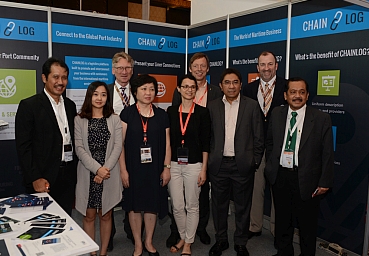 For the first time, port users will be able to access the important data needed to design their maritime logistics supply chain. For instance, cargo owners that source product from Vietnam can search CHAINLOG.net for the nearest container port, a listing of recommended agents and haulers to collect and deliver purchased the product to that port, the shipping line which connects to the port of delivery and for service providers at the arrival port.
For the first time, port users will be able to access the important data needed to design their maritime logistics supply chain. For instance, cargo owners that source product from Vietnam can search CHAINLOG.net for the nearest container port, a listing of recommended agents and haulers to collect and deliver purchased the product to that port, the shipping line which connects to the port of delivery and for service providers at the arrival port.
The idea for CHAINLOG came from the chainPORT industry group. chainPORT is the world’s first multilateral alliance between seaports and has been developed in direct response to the changing economic and ecological landscape facing Port Authorities; increased port completion, economic shocks impacting trade volumes and more stringent environmental standards.
CHAINLOG.net reflects the first step by port authorities to embrace the digital era and has the potential to migrate from simple data sharing to become a total visibility platform for the global maritime logistics chain.
CHAINLOG.net enables users to easily access a comprehensive overview:
- Of the capacity and infrastructure at world ports as well as a searchable database of logistics service providers at each port.
- The sailing schedules for each participating port enabling users to key in details of port pairings to find a comprehensive overview of shipping services on the route selected together with contact details for the responsible shipping line or NVO
Participation by Port Authorities in CHAINLOG .net demonstrates:
- To cargo owners and shipping lines that the Port Authorities are part of a system of ports that are central to the global supply chain.
- To Port Authorities stakeholders and its wider community that their port authority is actively promoting the port and its businesses globally.
Please visit www.chainlog.net to view a working model of the platform. For demonstration purposes, please choose the ports of Hamburg and Busan.
Ports interested in participating in CHAINLOG, please contact:
Mathias Schulz:
Email: schulz (at) hafen-hamburg
Phone: +49 40 37709 114
2017: CHAINPORT ACADEMY
BARCELONA NOVEMBER 2017
CHAINPORT ACADEMY UNDERLINES THE IMPORTANCE
OF PORTS WORKING TOGETHER ON INNOVATION
The ChainPORT Academy is a seminar organized by the international network of smart ports, called chainPORT, developed by the Global Institute of Logistics and led by the Port of Hamburg and Los Angeles and comprises some of the world’s most important ports. chainPORT offers the managers of the participating ports a framework for exchanging knowledge and advanced training, as well as access to an international and multidisciplinary network of professionals.
[rev_slider cp_academy_media]
This second ChainPORT Academy, officially opened by Sixte Cambra, Port of Barcelona President, and Santiago Garcia-Milà, Deputy General Manager of Strategy and Commercial, was structured into three thematic days: Innovation & Environment, Smart Port, and Cruises. The format of this event, which combines presentations by the participants with talks from international experts, colloquies, practical sessions and visits to port facilities, facilitates open and direct debate among the participants. One of the main values of the conference is the opportunity it provides for technical experts and managers of the various ports of the world to provide their respective solutions to the similar challenges and problems raised.
chainPORT representatives will meet both virtually and in person throughout 2017. The next meeting will take place at The International Association of Ports and Harbors (IAPH) worldwide conference in Indonesia in May. Port of Los Angeles will host the Annual Meeting of chainPORT in November.
Adapting ports to economic and social change
The first day revolved around Innovation and the Environment, which included a keynote speech by Peter de Langen, a specialist in transport and international logistics, as well as the participation of Carles Rua, head of Strategic Projects and Innovation at the Port of Barcelona; Jordi Vila, head of Environment; and Sergi Sauri, consultant in transport and logistics. This first day involved debates on the role of ports in an increasingly globalized economy as well as that of port authorities as catalysts of innovation, especially among the companies of their port communities.
The second debate of this day focused on Sustainability and involved the presentation of various environmental policies being rolled out by the ports of Los Angeles, Montreal, Felixstowe and Barcelona and also included a visit to the Enagas facilities at the Port of Barcelona. The second day of the ChainPORT Academy, dedicated to the Smart Port, included presentations and practical sessions on the latest developments in smart ports, with a presentation on the experience of the ports of Hamburg, Rotterdam, Antwerp and Barcelona in this area. This day, which was attended by Joel Curado, head of Strategy and Innovation at CISCO; Javier Gallardo, General Manager at PortIC; Catalina Grimalt, deputy Manager of Organisation and Internal Resources at the Port of Barcelona; and Enric Rodellas, Port Plan manager, included a visit to the BEST container terminal.
During the third day, which took place today with the participation of Mar Pérez, Head of Cruises at the Port of Barcelona, the representatives of the ports of Busan, Gdynia and Persero presented their respective development projects. The programme, which included a visit to a cruise terminal on Adossat Wharf, concluded with a debate on the main challenges in innovation and smart port facing ports over the coming years.
Finally, it was announced that the next ChainPORT Academy will be held in Montreal on 5 and 6 September 2018.
About chainPORT
chainPORT has been developed in response to the changing economic and ecological landscape facing the maritime sector, including economic shocks impacting trade volumes, challenges posed by mega vessels, the emergence of IT megatrends and more stringent environmental standards.
Port authorities in their position as ‘trusted and honest brokers’ are being increasingly relied upon by cargo owners, shipping lines, and modal operators to perform the function of coordinators and communicators in support of supply chain optimization. This development is being driven by cargo owner’s interests and expectations for door-to-door rather than traditional port-to-port solutions.
Locally, port authorities are responding to this demand by leveraging their position to develop port community systems, which gather, collate and share data from the various stakeholder groups within their ports to aid better coordination, communication, and control around cargo flow. Data is shared with appropriate parties on a need to know basis (without commercial infringement) in the best interest of the local supply chain.
chainPORT partners are committed to leveraging the latest developments in technology to realize their vision of a smart, interconnected and digital world port system. The initiative brings together like-minded port professionals to share with, learn from and benchmark with each other their respective experiences in their newfound role of supply chain optimizers.
2017: chainPORT GATHERS MOMENTUM
HAMBURG JANUARY 2017
chainPORT GATHERS MOMENTUM AS PORT LEADERS
COMMIT TO STRONG 2017 WORK PROGRAM
The partnership is driven by several key working groups reporting to a steering committee comprising the CEO’s and Presidents from the member ports. The working groups focus on a range of subjects including smart IT solutions, the implications, and solutions for ultra large container vessels and shaping digital change in port authorities (people & processes).
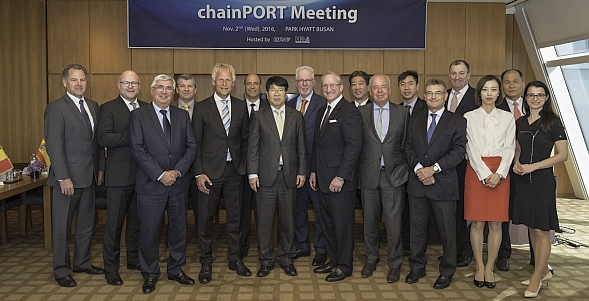
CLICK IN PICTURE FOR GROUP CAPTION
Planning is at an advanced stage for the development of a chainPORT Academy. The Academy offers employees of participating ports access to continuing professional education and gives them access to a multidisciplinary network of professionals from chainPORT’s.
chainPORT partners are also actively developing chainLOG, an online portal which catalogs in searchable database details of logistics service providers in each individual port community. The resource enables ports and companies to promote and interconnect their business with customers and service providers from the international maritime environment.
chainPORT representatives will meet both virtually and in person throughout 2017. The next meeting will take place at The International Association of Ports and Harbors (IAPH) worldwide conference in Indonesia in May. Port of Los Angeles will host the Annual Meeting of chainPORT in November.
About chainPORT
About chainPORT
chainPORT has been developed in response to the changing economic and ecological landscape facing the maritime sector, including economic shocks impacting trade volumes, challenges posed by mega vessels, the emergence of IT megatrends and more stringent environmental standards.
Port authorities in their position as ‘trusted and honest brokers’ are being increasingly relied upon by cargo owners, shipping lines, and modal operators to perform the function of coordinators and communicators in support of supply chain optimization. This development is being driven by cargo owner’s interests and expectations for door-to-door rather than traditional port-to-port solutions.
Locally, port authorities are responding to this demand by leveraging their position to develop port community systems, which gather, collate and share data from the various stakeholder groups within their ports to aid better coordination, communication, and control around cargo flow. Data is shared with appropriate parties on a need to know basis (without commercial infringement) in the best interest of the local supply chain.
chainPORT partners are committed to leveraging the latest developments in technology to realize their vision of a smart, interconnected and digital world port system. The initiative brings together like-minded port professionals to share with, learn from and benchmark with each other their respective experiences in their newfound role of supply chain optimizers.
2017: CHAINPORT THIRD AGM
LOS ANGELES NOVEMBER 2017
SUPPLY CHAIN DIGITIZATION OF OCEAN CARGO GATEWAYS EXAMINED BY CHAINPORT AT THIRD AGM
The partnership is driven by several key working groups reporting to a steering committee comprising the CEO’s and Presidents from the member ports. The working groups focus on a range of subjects including smart IT solutions, shaping digital change in port authorities (people & processes).
The chainPORT initiative is led by the Ports of Los Angeles and Hamburg Port Authority in Germany, in collaboration with the Global Institute of Logistics. Other ports participating in the third annual meeting are Shanghai, Antwerp, Barcelona, Montreal, Felixstowe, Indonesia, and Shenzhen.
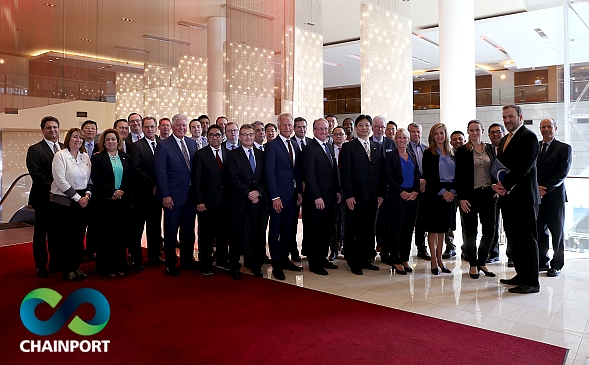
CLICK HERE FOR CAPTION
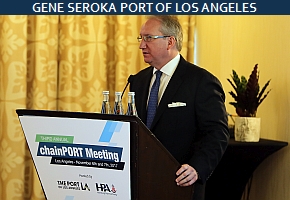 “Working together to explore best practices and innovation, as well as leading-edge technology to improve port operations is more important than ever in a global environment,” said Port of Los Angeles Executive Director Gene Seroka. “As a port, we need to continue to evolve and adapt to remain both competitive and relevant.”
“Working together to explore best practices and innovation, as well as leading-edge technology to improve port operations is more important than ever in a global environment,” said Port of Los Angeles Executive Director Gene Seroka. “As a port, we need to continue to evolve and adapt to remain both competitive and relevant.”
Seroka kicked off the two-day meeting with a presentation about Port of Los Angeles’ supply chain optimization pilot project in partnership with GE Transportation. Together they are developing a digital portal that provides real-time shipping information for cargo owners and supply chain providers to more effectively track and plan for movement of their cargo from ocean transit to final destination. Based on the initial pilot results, the port anticipates efficiency gains of between eight and 12 percent as the enhanced solution is rolled out.
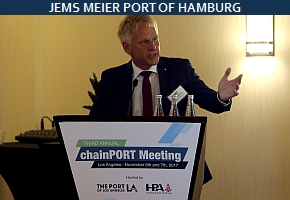 “Port operations are becoming more and more complex, and we strongly believe port authorities working together around the globe can add significant extra value to the global supply chain,” said Jens Meier, CEO of the Hamburg Port Authority. “Collaboration in a global network of ports and digitization is the way of the future.”
“Port operations are becoming more and more complex, and we strongly believe port authorities working together around the globe can add significant extra value to the global supply chain,” said Jens Meier, CEO of the Hamburg Port Authority. “Collaboration in a global network of ports and digitization is the way of the future.”
Meier focused his presentation on a vision of the digitalized port of the future and what needs to be done to get there. Presentations were then given by leads of each of chainPORT’s five working groups: Smart IT solutions; Implications & Solutions for Ultra Large Container Vessels; Digital Change within Port Authorities; Project chainLOG; and the Port Academy.
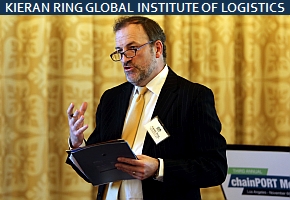 “Historically ports were measured on their ability to accommodate ships and other modes of transport effectively and efficiently,” said Kieran Ring, CEO of the Global Institute of Logistics, which was instrumental in getting the chainPORT alliance off the ground. “However, increased international trade and the global economic environment have given rise to a new breed of customers who demand optimum flexibility, efficiency, and transparency in their dealings with ports.”
“Historically ports were measured on their ability to accommodate ships and other modes of transport effectively and efficiently,” said Kieran Ring, CEO of the Global Institute of Logistics, which was instrumental in getting the chainPORT alliance off the ground. “However, increased international trade and the global economic environment have given rise to a new breed of customers who demand optimum flexibility, efficiency, and transparency in their dealings with ports.”
One keynote address was given by Nick Vyas, director of the Center for Global Supply Chain Management at the University of Southern California’s Marshall School of Business.
“My focus was on supply chain optimization and digitization,” he says. “These are issues we will revisit when USC hosts our 6th Annual Global Supply Chain Excellence Summit next August.”
Jay Samit, Independent Vice Chairman of Deloitte Digital, was the other keynote speaker. He addressed the challenges ports face, driving their needs for creative solutions.
Visiting port representatives also toured the Port of Los Angeles, and paid a visit to Virgin Hyperloop One, the commercialized land-transportation concept for goods and passenger movement currently being developed in Los Angeles.
About chainPORT
chainPORT has been developed in response to the changing economic and ecological landscape facing the maritime sector, including economic shocks impacting trade volumes, challenges posed by mega vessels, the emergence of IT megatrends and more stringent environmental standards.
Port authorities in their position as ‘trusted and honest brokers’ are being increasingly relied upon by cargo owners, shipping lines, and modal operators to perform the function of coordinators and communicators in support of supply chain optimization. This development is being driven by cargo owner’s interests and expectations for door-to-door rather than traditional port-to-port solutions.
Locally, port authorities are responding to this demand by leveraging their position to develop port community systems, which gather, collate and share data from the various stakeholder groups within their ports to aid better coordination, communication, and control around cargo flow. Data is shared with appropriate parties on a need to know basis (without commercial infringement) in the best interest of the local supply chain.
chainPORT partners are committed to leveraging the latest developments in technology to realize their vision of a smart, interconnected and digital world port system. The initiative brings together like-minded port professionals to share with, learn from and benchmark with each other their respective experiences in their newfound role of supply chain optimizers.
HAMBURG JUNE 2017
HHLA CONTAINER TERMINAL ALTENWERDER (CTA)
CERTIFIED “BEST IN CLASS”
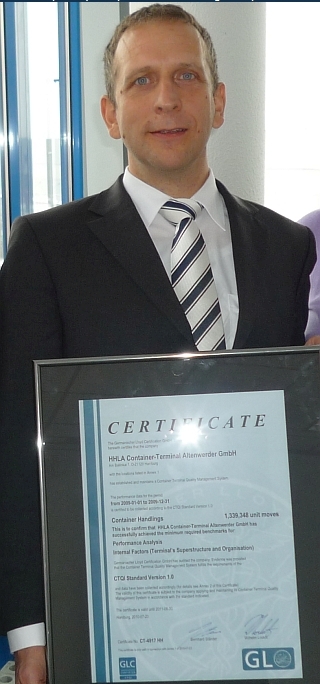
In 2008, CTA became the first container terminal in the world to be certified with the CTQI standard. The customers of HHLA primarily benefit from this commendation. It reassures them of the high levels of performance and compliance with all quality standards on the premises.
“We have worked hard for this award, chiefly on behalf of our customers, the shipping companies, rail operators and haulage companies.”
Oliver Dux: , Managing Director at ALTENWERDER
Alongside criteria such as how well the terminal is equipped with container gantry cranes and how well those perform, the efficiency of loading and discharging ocean-going vessels, container trains, trucks and inland ships was also put to the test. Once internal audits had been completed by specially trained terminal employees, DNV GL conducted external audits.
CTA Managing Director Oliver Dux: “We have worked hard for this award, chiefly on behalf of our customers, the shipping companies, rail operators and haulage companies. Of particular note was that not one of the external audits in our ten areas identified any shortcomings in our processes. DNV GL even confirmed to us that we have in fact achieved further optimisations.”
2017: INSTITUTE LEAD PANEL DEBATE AT IAPH
BALI- INDONESIA-MAY 2017
INSTITUTE LEADS PANEL ON PORT COLLABORATION AT IAPH 2017
Kieran Ring CEO of the Global Institute of Logistics Debated Current Thinking on Collaboration Amongst Ports With Port Leaders at the International Association of Ports and Harbours World Conference in Bali.
The key takeaway from the session was that port authorities who embraced their new found role as ‘honest and trusted brokers’ in the global maritime supply chain process, particularly in the area of data mining and sharing could add significant value to the supply chain process.
The 30th IAPH World Ports Conference convened in Bali Nusa Dua, Indonesia, May 7-12, 2017, under the theme of “Enabling Trade, Energizing The World”, was a great success, attracting more than 650 delegates, accompanying persons, guest speakers, sponsors and exhibitors from 50 countries in the world.
The Institute was invited to debate the issue of collaboration as part of best practice in port management. The title of the panel was ‘Collaboration Opportunities To Strengthen Cooperation And Sustainability Among Ports‘ The subject was discussed from a variety of perspectives, firstly what collaboration meant from an international perspective and in particular how concepts like chainPORT were adding value to the supply chain process. Secondly, regionally on how chainPORT logic is applied in the context of regional port systems and in this case the Indonesian port system was the case study debated.
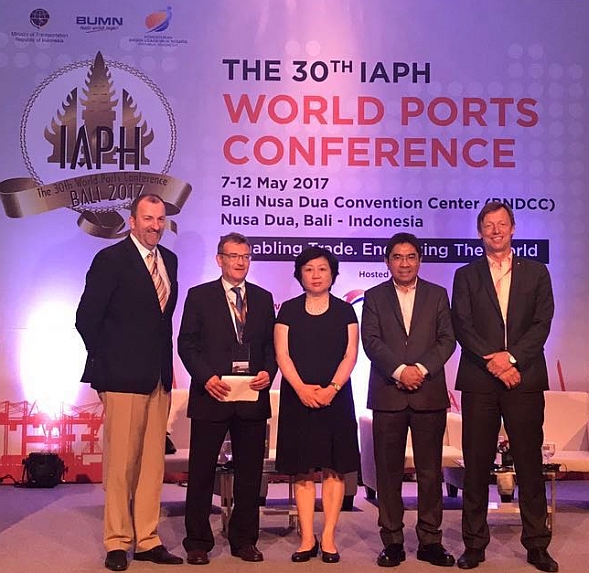
PICTURED FROM RIGHT TO LEFT ARE: Kieran Ring CEO GIL, Santiago Garcia-Mila, IAPH President, Deputy Executive Director At Port Of Barcelona, Madam Yue Yuan, Deputy Director General Of Guangzhou Port Authority, Elvyn G. Masassya, CEO Of Indonesia Port Corporation II and Tino Klemm CFO Of Hamburg Port Authority.
Elvyn G. Masassya, CEO Of Indonesia Port Corporation II opened the session with his presentation, ‘Collaboration Opportunities To Strengthen Cooperation And Sustainability Among Ports – From Indonesia’s Port Perspective, this was followed by a presentation from Tino Klemm CFO Of Hamburg Port Authority on ‘Revisiting The Role Of Ports In A Digital Supply Chain Through Cooperation And Collaboration’, Santiago Garcia-Mila, IAPH President, Deputy Executive Director At Port Of Barcelona followed Hamburg and the session was closed by Madam Yue Yuan, Deputy Director General Of Guangzhou Port Authority who presented on, ‘Exploring A New Model Of Cooperation For Mutual Benefits’
The presentations were followed by a lively debate on the evolving role of the port authority as the actor in global maritime logistics chain who enjoys the status of ‘honest and trusted broker’ Delegates and speakers debated how this status could be leveraged to drive collaboration both locally and globally. The overriding takeaway from the session was that port authorities who embraced their new found role and complemented this development with the deployment of ‘smart’ tools as part of a broad digitization strategy would succeed and in so doing add significant value to the supply chain process.
NOTES TO EDITORS
ABOUT INTERNATIONAL ASSOCIATION OF PORTS AND HARBOURS:
Founded in 1955, the International Association of Ports and Harbors (IAPH) is a non-profit global alliance of roughly 180 ports and 150 maritime companies and institutes representing about 90 countries. The IAPH is dedicated to fostering cooperation among ports and harbors and promoting the vital role they play in creating a peaceful, more prosperous world.
Based in Tokyo and recognized as the only voice speaking for ports around the globe, the IAPH has Consultative NGO Status from the United Nations and is active in developing international trade and maritime policy.
IAPH member ports handle about 80 percent of world container traffic and more than 60 percent of all international maritime trade.
ABOUT GLOBAL INSTITUTE OF LOGISTICS
The Global Institute of Logistics (GIL) was established in 2003 under the Chairmanship of renowned US logistician and author Robert V. Delaney in response to the global logistics industry’s call for “joined up thinking” amongst stakeholders in the global supply chain. GIL looks to resolve the challenges facing the global logistics chain of managing single transport modes, modal systems, and targets which are set on stand-alone operations to create a seamless global logistics system.
Acting as a think tank within the sector, GIL brings together thought-leaders and thought-followers as part of a global knowledge network committed to building up the information base, best practices and standards needed. This, in turn, creates a platform through which knowledge is shared, best practice is adopted and trade developed. Today the Institute is a community of organizations and professionals from across the world that share a commitment to collaborating on global logistics solutions.
The Institute’s mission is to ‘Network the Global Logistics Community’
For further information, visit www.globeinst.org
For further information,
Contact the Institute’s Media Director:
mediadirector@globeinst.org
2017: LINDA COLLIER BOARD OF ADVISORS APPOINTMENT
TORONTO CANADA FEBRUARY 2017
GLOBAL INSTITUTE OF LOGISTICS ANNOUNCES APPOINTMENT OF LINDA M. COLLIER (CANADA) TO ITS BOARD OF ADVISORS
The Institute has appointed Triad International Freight Forwarding CEO, Ms. Linda M. Collier to its Board of Advisors at a Press Conference held in Toronto, Canada.
The Global Board of Advisors provides GIL support with strategic and technical advice, resource mobilization and promotion and outreach. The Board combines the ideas, expertise, and resources of leading thinkers and activists from all facets of global logistics all united by a common vision to improve the global supply chain.
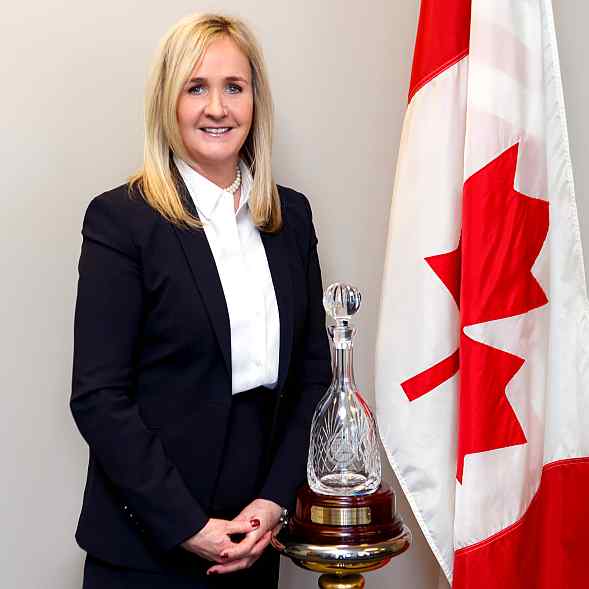
The appointment of Linda M. Collier, CEO, and Founder of Toronto-based Tri-ad International Freight Forwarding Limited to the board, reflects GIL’s ambition to broaden its subject matter knowledge of the global independent freight forwarding sector. Tri-ad has been named Canada’s Fastest Growing Company for 3 consecutive years, and founder, Linda Collier, has received many other awards for her extraordinary leadership. Linda will work closely with the Institute on a number of initiatives, the most prominent of which will be the convening and Chairing of the Institutes first global women leaders in logistics council which is being established to reflect the growing influence of women at C level in global logistics.
Commenting on today’s announcement, Kieran Ring CEO at the Institute said
“I am looking forward to working with Linda and extend to her on behalf of the Institute a very warm welcome to our Board of advisors. I very much welcome Linda’s contribution to the development of GIL and in particular to building up a platform through which women logistics leaders from across the world can find expression.
Commenting on today’s announcement, Linda Collier President and Founder of Tri-Ad International Freight Forwarding said:
“I am delighted to join the Board of Advisors at the Institute. I support GIL’s mission to promote collaboration between all stakeholders in the industry and am confident that I can contribute to this mission by bringing my 30 years’ experience of working in the industry to the table.
I am particularly honored to be invited to champion the role of women in logistics leadership, through my Chairmanship of GIL’s first women leaders in logistics council. I look forward to bringing together the finest female minds in the business to discuss the growing role of women in the sector and to encourage further participation at all levels by women.
I’m privileged to accept these new roles in GIL’s leadership and access best global practices, networks, and innovation for Canada. I’m deeply committed to sharing the benefits of my GIL relationship with my clients, peers, employees and women throughout our industry”
NOTES TO EDITORS
ABOUT TRI-AD INTERNATIONAL FREIGHT FORWARDING
Tri-ad began doing business in 1988 and has grown into a multi-million-dollar freight forwarding company. Our name means “Three Modes” and represents the three major modes of transportation offered by our company: Land, Sea and Air.
Founded by Linda M. Collier, a former transportation executive with years of experience at a major European freight forwarder. Today, Tri-ad has over 90 employees and has become one of the premier international freight forwarding companies around the world. Because of our many global partners, we can offer a seamless system that integrates the three modes of transportation, giving our clients faster, more secure services.
Tri-ad has been named Canada’s Fastest Growing Company for 3 consecutive years, and founder, Linda Collier, has received many other awards for her extraordinary leadership. We lead the competition with an ever-expanding array of professional services for every major market segment. At Tri-ad, we take full advantage of the most innovative technological breakthroughs for the custom freight forwarding industry.
ABOUT GLOBAL INSTITUTE OF LOGISTICS
The Global Institute of Logistics (GIL) was established in 2003 under the Chairmanship of renowned US logistician and author Robert V. Delaney in response to the global logistics industry’s call for “joined up thinking” amongst stakeholders in the global supply chain. GIL looks to resolve the challenges facing the global logistics chain of managing single transport modes, modal systems and targets which are set on stand-alone operations to create a seamless global logistics system.
Acting as a think tank within the sector, GIL brings together thought-leaders and thought-followers as part of a global knowledge network committed to building up the information base, best practices and standards needed. This, in turn, creates a platform through which knowledge is shared, best practice is adopted and trade developed. Today the Institute is a community of organizations and professionals from across the world that share a commitment to collaborating on global logistics solutions.
The Institute’s mission is to ‘Network the Global Logistics Community’
For further information, visit www.globeinst.org
For further information,
Contact the Institute’s Media Director:
mediadirector@globeinst.org
2017: TRI-AD ACCREDITED BEST IN CLASS
TORONTO CANADA-FEBRUARY 2017
TRI-AD INTERNATIONAL FREIGHT FORWARDING ACCREDITED WITH ‘BEST IN CLASS’ STATUS
Global Institute of Logistics Accredits Tri-Ad International Freight Forwarding with Best in Class Accreditation in Recognition of the development of White Glove Smart Courier Services in Canada
The Global Institute of Logistics has today announced that TRI-AD INTERNATIONAL FREIGHT FORWARDING has been accredited with Best in Class status in recognition of the development of its White Glove Smart Courier Service in Canada. The announcement is the result of the Institute’s ongoing research into the evolving role of the Independent Freight Forwarder in Global Logistics, which will be published in 2017. The research is in response to the increasing trend by Beneficial Cargo Owners (BCO’s) to outsource the management of their freight traffic, logistics and supply chain support functions to the independent freight forwarding sector.
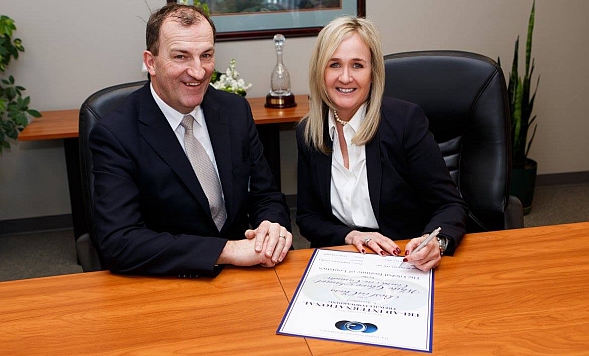
In identifying Triad as Best in Class, the Institute is recognizing the pioneering work in white glove logistics services at the company under the stewardship of Linda Collier, its founder, and President. White glove service is one of the supply chain’s most complex specialty areas, encompassing everything from first- and final-mile value-added services, to delicate or high-value product handling. The White Glove Smart Courier program developed at the company demonstrates the unique value creation that is achieved by skilled logisticians in response increasing complexity in supply chains.
The specific application of the White Glove Smart Courier concept that was evaluated by GIL was the solution developed for the Canadian banking sector. Within the Canadian market, there are 6 plus global Banks, each with a demand for specialized White Glove services. Triad developed a high-security process to remove assets, protect the data information stored on these assets, and show full traceability to destruction and/or data wiping. To achieve this objective Triad upskilled its driver workforce to perform pre-inspection of goods, and assembly/commissioning on-site thereby replacing the need and high cost for on-site technicians. Such has been the success of the program, Triad performs these services throughout Canada, the United States, and the Caribbean at the rate of 10,000 devices per month.
Commenting on today’s announcement, Kieran Ring CEO at the Institute said
“I am delighted to present Tri-Ad International Freight Forwarding with its accreditation as Best in Class, I have worked very closely on the research which informed our decision and am in no doubt that in Triad the Institute has identified one of the world’s leading independent freight forwarders. The story of the company’s development is inspiring and demonstrates how by adopting a customer first, market aware approach independent freight forwarders can not only survive but thrive in the global marketplace.
Triad’s White Glove Smart Courier program demonstrates the power of logistics when properly and comprehensively applied. Logistics is the art and science of adding value to goods before, in and after transit between point A and point B. Triad’s program incorporates all these elements by including appointment setting, pre-inspection of goods, assembly/commissioning on site, removal of all packaging material and products to be returned before finally performing an accountable and sustainable end of life/recycling program. I have no doubt that Triad are making a significant contribution to the supply chain which supports the nation’s banking sector by thinking and acting lean and green”
Commenting on today’s announcement, Linda Collier President and Founder of Tri-Ad International Freight Forwarding said:
“I am delighted to accept this accreditation as ‘Best in Class’ from the Global Institute of Logistics. Being the best has always been and will always remain our mission at Triad. We endeavor to be the best in every aspect of our business, including the best freight forwarder, the best partner and the best employer.
Thanks to our clients for choosing Triad. Their loyalty ensures our work and services meets their satisfaction and maintains our global position. I’m very proud of our employees. Thanks to their dedication and commitment, Triad is the epitome of ‘Best in Class’.
I very much look forward to collaborating with the Institute on the development of our case study and to working with the other ‘Best in Class’ forwarders from around the world in building up the knowledge base around best practice”
NOTES TO EDITORS
ABOUT TRI-AD INTERNATIONAL FREIGHT FORWARDING
Tri-ad began doing business in 1988 and has grown into a multi-million-dollar freight forwarding company. Our name means “Three Modes” and represents the three major modes of transportation offered by our company: Land, Sea and Air.
Founded by Linda M. Collier, a former transportation executive with years of experience at a major European freight forwarder. Today, Tri-ad has over 90 employees and has become one of the premier international freight forwarding companies around the world. Because of our many global partners, we can offer a seamless system that integrates the three modes of transportation, giving our clients faster, more secure services.
Tri-ad has been named Canada’s Fastest Growing Company for 3 consecutive years, and founder, Linda Collier, has received many other awards for her extraordinary leadership. We lead the competition with an ever-expanding array of professional services for every major market segment. At Tri-ad, we take full advantage of the most innovative technological breakthroughs for the custom freight forwarding industry.
ABOUT GLOBAL INSTITUTE OF LOGISTICS
The Global Institute of Logistics (GIL) was established in 2003 under the Chairmanship of renowned US logistician and author Robert V. Delaney in response to the global logistics industry’s call for “joined up thinking” amongst stakeholders in the global supply chain. GIL looks to resolve the challenges facing the global logistics chain of managing single transport modes, modal systems and targets which are set on stand-alone operations to create a seamless global logistics system.
Acting as a think tank within the sector, GIL brings together thought-leaders and thought-followers as part of a global knowledge network committed to building up the information base, best practices and standards needed. This, in turn, creates a platform through which knowledge is shared, best practice is adopted and trade developed. Today the Institute is a community of organizations and professionals from across the world that share a commitment to collaborating on global logistics solutions.
The Institute’s mission is to ‘Network the Global Logistics Community’
For further information, visit www.globeinst.org
For further information,
Contact the Institute’s Media Director:
mediadirector@globeinst.org
CASE STUDY IGLU
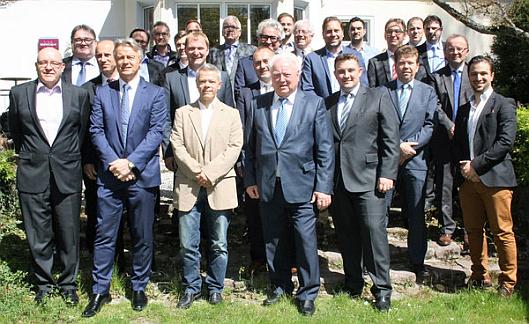
2016 WAS AN HISTORIC MILESTONE FOR IGLU AS IT PASSED THE 20,000 TONS MARK
In the year 2000, Dieter Haltmayer established IGLU AIR CARGO GmbH as a joint venture of 19 German forwarding agents. At a time of globalization and mergers, these 19 agents came to the conclusion that medium sized forwarders could only be competitive if they combined their cargo for negotiations with the carrier as far as rates and capacity were concerned.
Cargo is forwarded in containers or on pallets and IGLU makes capacity commitments with airlines for particular flights on specific days. IGLU members benefit from the advantages of competitive rates and faster clearances at the destination because containers and pallets are transferred to a neutral break bulk agent right after landing. IGLU members maintain their individual relationships with carriers. IGLU is simply a tool with which to obtain better purchasing rates. Airlines benefit from having a single point of contact, instead of having to negotiate with 23 individual companies. Today, IGLU members load 1800 tons of airfreight every month to 80 destinations around the world, matching the levels of multinationals.
The following report traces the development of IGLU.
GENESIS
In May 1999 Wilhelm Althen, the influential chairman of Lufthansa Cargo, had prophesied a less than rosy future for small forwarders at the annual conference of Cargo Network Services, the US arm of the airlines’ umbrella organization IATA. Althen predicted that half of the 3600 IATA agents than in business would have disappeared within five years. The small players were not capable of surviving according to the Lufthansa chief who would continue in his post until 2007. He claimed the future belonged to the bigger play- ers in the industry and increasingly to the multinationals. The takeover game had only just begun. Althen forecast that in, “three to five years”, between five and seven large groups would control 70-80 percent of international airfreight.
Dieter Haltmayer was seething, while his son Stephan was less upset; he was used to this talk from the likes of Schenker, Kühne & Nagel or DHL, “the big boys would have liked to see the back of us”. But it was too much for his father. “We medium-sized businesses”, his credo went, “need to combine our strengths more than ever”. Haltmayer Sr. drummed up support amongst like-minded individuals. In August 1999 he suggested a meeting, which took place in the rooms of the airport operating authority FAG, attended by representatives from Agotrans, Alpha Trans, Jas Airfreight, Quick Cargo Service and Südkraft. Also in attendance were Willy Korf from the Asso-
In August 1999 he suggested a meeting, which took place in the rooms of the airport operating authority FAG, attended by representatives from Agotrans, Alpha Trans, Jas Airfreight, Quick Cargo Service and Südkraft. Also in attendance were Willy Korf from the Association for Freight and Logistics in Hessen and Florian Pfaff from Lufthansa. After an analysis of the market situation for medium-sized companies, the five companies came to the conclusion that what counted now, “in the age of globalization, and increasing reports of mergers and cooperations, is to combine our forces and to bring together companies willing to cooperate in an association of common interests”.
The Interessengemeinschaft Luftfracht (German for, “association of common interests in airfreight“, the source of the name “Iglu”, which is German for, “igloo”) was also supposed to work against the growing tendency of some airlines to offer preferential treatment to certain business partners. “Iglu”, said Haltmayer in an interview with the DVZ at the time, “should increase the competitiveness of its members and simultaneously help to improve the carriers’ service“
Seven perspectives for the future were outlined in writing:
- We are competitive in the market again with the same starting point as the major shippers.
- Guaranteed access to capacity giving our customers confidence.
- Strengthening of our negotiating position with fixed rate agreements.
- Securing improved service standards – through pallet mostly runs smoothly, guaranteed departure and arrival times.
- Improvement of our income through better buying rates.
- Increased productivity through a more reliable service.
- Development of a future-oriented IT system – computer connectivity is essential
THE GROUND RULES
On the 17th November 1999 that year the initiators of the alliance invited all interested forwarders to the Holiday Inn hotel in Bad Soden. The response was overwhelming with 69 companies registering to attend. In his opening address, Dieter Haltmayer emphasized that it was time to create a neutral association of shippers and put the airlines under pressure, “our job as forwarders is to advise customers and to choose the best and most affordable transport route, independently of the interests of individual airlines“.
But above all back then it was the national carrier Lufthansa Cargo, remembers Haltmayer Jr, “who wanted to go another way”. Reading between the lines of what Althen was saying, he meant: at Lufthansa, we are only interested in the top ten forwarders. They fill 60 percent of our aircraft, and the other 40 percent, handled by 300 forwarders or more, is too much of a headache with all the work it causes.
“It cost them too much in terms of manpower”, says Stephan Haltmayer, “they wanted to cut costs and thought the smaller players could load via their larger competitors”. But very few were prepared to accept this. The medium-sized sector’s answer was cooperation. IGLU along with the Future Group and the Challenge Group were three alliances that resisted the strategy pursued by Lufthansa Cargo. However, the individual groups had different approaches. Future and Challenge were cooperations consisting of friendly agents, forwarders on good terms with each other who loaded freight with each other. This concept, as Stephan Haltmayer explains, “was transparent. Every forwarder knew who the customers behind the freight were, the shipper and the consignee. Each member of the alliance was revealing his customer base to everyone else in the group”. And it is, “fatal when the competition knows who my customers are”.
Iglu had been built on another idea. Iglu was neutral. It was founded as a purchasing cooperative for volume. The principle was, “to make volume contracts with the airlines. Instead of 10 tons to Hong Kong, Iglu suddenly had 100 tons, a much larger amount. And naturally, these amounts made it possible for us to buy at substantially cheaper freight rates”. The Iglu principle was to make volume contracts with selected airlines, “We buy like a multinational concern because together we have the same volume as the big players. Then these prices are passed on to our members strictly net”.
With the Future Group and the Challenge Group freight was loaded onto the pallet for all to see, “a transparent system”. One of the agents might be, for example, the master loader for Singapore, another for Los Angeles, and a third for Sydney or Taiwan. Everyone who has freight for Singapore brings their freight to the master loader for Singapore, he loads everything onto the appropriate pallet and, of course, can see exactly, “that the label is from Siemens, from VW, or there is freight from BASF, from who knows which customer”. The same is true of the forwarder receiving the shipment. He has to distribute the freight amongst the various customers and sees who his partners’ customers are.
However, Iglu, as an association of forwarders, makes a contract with the airline but then each member of that association delivers his own freight to the airline separately. So no-one discovers, “which customer is behind the freight”. For the biggest concern of a forwarder is, “that the others find out who your customers are, and what rate they are paying”.
With Iglu it is also clear that everyone has the same rate.
INITIATION
Back in 1999, it was difficult for the initiators of Iglu to bring forwarders together around a table and get them talking. Everyone mistrusted everyone else. The great merit of the Iglu founders was to plant this thought in the head of medium-sized forwarders, “we need to compete against the big boys, who are ruining the prices for us”. For the medium-sized forwarders to compete meant acting in unison.
This was understood by the 19 founder members who signed a member- ship agreement on the 4th October 2000. These original members included: Alpha-Trans in Frankfurt, B & A Luft & Seefrachtspedition in Nuremberg, DACO Air Transport in Dusseldorf, Damco Maritime in Hamburg, Ege Trans in Marbach, Fastsped in Hamburg, FMS MonFracht in Frankfurt, IAS Interfracht Air Service in Bremen, J. Dahmen & Co. in Solingen, JAS Forwarding in Mörfelden-Walldorf, M.G. International Transport in Siegen, Mairon Cargo Systems in Dusseldorf, Pantra Spedition und Consulting in Pforzheim, Quick Cargo Service in Mörfelden-Walldorf, Südkraft Logistik in Munich, TCA Globe Freight Logistic in Hamburg, World Freight in Aschheim Dornach, and Zell and Mohr Luftfracht in Hamburg. Today Iglu has 23 members.
Many a forwarder, says Stephan Haltmayer, would be happy to join Iglu. But the association is not interested in unlimited expansion. But Haltmayer rejects the criticism that Iglu is an elitist club that seals itself off from others, “No, the people who are in now are people who we get along with, people you can talk to. But there are others who are trouble-makers, difficult people who would like to exert an influence. For now, we are steering by feeling so that everything continues to work. Too many voices spoil the broth”.
There have been Iglu board members, the 54-year-old recalls, who had ideas to take Iglu in different directions. Instead of just buying freight in bulk, why not products such as waybills, paper, stamps, and courier services? There was even a suggestion to also use Iglu for import, “that was going too far for us, we didn’t want that. And it was for the best. If we dedicate everything to Iglu, then we become too dependent on it”. Iglu is a good concept just the way it is.
“The strength of Iglu”, says Stephan Haltmayer, “is in the association, the strength of each member is in the focus on medium-sized business: our customers are usually not big multi- nationals, our customers are predominately medium-sized businesses. We understand their philosophy much better than the multinational forwarders, who work better with firms of their own size like VW, Bosch or BMW. It’s like the difference between Champions League football and Bundesliga football. The multinational firms with offices worldwide play in the Champions League. We medium-sized forwarders play in the Bundesliga. Quick Cargo itself is in the top half of the league, as one of the top ten owner-run IATA forwarders. This is the area where we are active, and these are the kind of customers that we serve”.
This certainly does not mean though that Quick Cargo never takes a place at the top table. Around Christmastime 2013 the company shipped windshields to Mexico when VW was threatened with an assembly line standstill. In such cases, this kind of freight needs to be flown because a halt in production would be hugely expensive.
“But”, as Stephan Haltmayer stresses, “you are only ever as strong as the rates you can offer”. Quick Cargo alone naturally cannot match the freight volumes of a Schenker or Kühne & Nagel. But when all 23 Iglu members are taken together, they can boast of a comparable volume to Schenker. Iglu belongs to the top ten of the “Bundesliga” and is one of the ten strongest IATA agents in Germany.
IGLU IN PRACTICE
A forwarder only really gets to show his service standards when something goes wrong, “and there is always something that can go wrong: a plane has a damaged engine, customs stipulates certain conditions and then the customer needs a reliable contact person. But when he calls the multinational forwarder to be greeted by voicemail, or asked to press a sequence of buttons by the voice of a computer to be directed further, then the customer soon says, ‘My God, what kind of service is this?” With the medium-sized forwarder, emphasizes Stephan Haltmayer, there is a real human being answering the telephone and able to give the customer information. Someone who can help. That is the difference.
According to Haltmayer, the Iglu members benefit from a discount on freight rates of between five and ten percent, depending on the details of what is flown, “the investment in Iglu has definitely paid off”. The organization is financed through a monthly membership fee of around 1000 Euros, varying according to the number of branches a member has. Each additional branch office costs 50 Euros on top of the basic fee. Iglu’s monthly income of 23,000 Euros covers the salaries of its four staff and other costs. It is a non-profit organization. The members do not want Iglu to make a profit but to help them make a profit.
Asked whether medium-sized forwarders need Iglu to survive, Haltmayer answers slightly evasively, “there are many who survive without Iglu”. But in the long run, the purchasing cooperative is certainly important. Profit depends on the buying rate. If one can earn more, then one can also invest more and consequently grow further. For this reason, Iglu makes a difference and is very helpful.
Quick Cargo has benefited from Iglu tremendously. Since Iglu’s foundation in 2000, Quick Cargo has, “really taken off”, say both Haltmayers in unison. But it was certainly not Iglu alone, there were other factors too. Stephan brought new momentum into the company as a young entrepreneur, and he also, “learned from me how to be a salesman”, adds Haltmayer Sr. This led to many new contacts abroad. The Euro also replaced national currencies in many parts of Europe, making payment transactions much simpler. They are both in agreement, “that we also already had a team that was much better than the average in the industry”.
NETWORK PIONEER
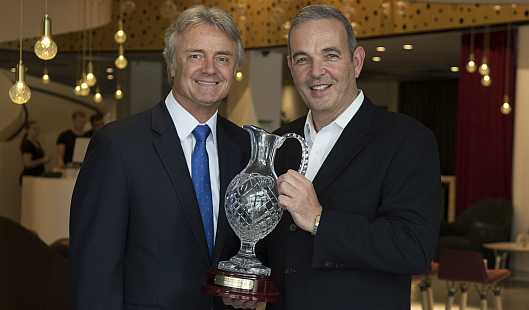
ON THE OCASSION OF THE ALLIANCE’S ACCREDITATION AS GLOBAL BEST IN CLASS NETWORK
Beneficial Cargo Owners (BCO’s) are global in their approach to sourcing and distribution and as a result, outsource to freight forwarders who can provide global coverage. Therefore for independent freight forwarders, membership of a global network is crucial. Network membership enables freight forwarders to form relationships with other freight forwarding companies, gain access to their resources and link with their activities all critical in connecting BCO’s to international supply and distribution networks.
More crucially networks can drive better pricing. On both fronts, QCS is the pioneer. Combining their resources and activities with those of other freight forwarders QCS customer’s materials moving faster at lower costs with superior customer service than competitors.The networks are the extended arm of Quick Cargo abroad. “A multinational concern”, explains Stephan Haltmayer, “has its own offices throughout the world. That is something we do not have. What we have are partners abroad, agents who work together with us”. This is the story of the QCS approach to network development and membership.
THE WHY OF NETWORK MEMBERSHIP
If Quick Cargo has a carriage paid shipment to Chicago, then we need a partner there who works just like QCS, who receives the freight, takes care of customs clearance, and delivers it to the customer. All the costs involved are paid by the shipper. Equally, the forwarder in Chicago also needs a partner in Frankfurt. He might have a customer whose freight must be collected in Buxtehude, and so he says, “Haltmayer, fly it to Chicago for me and I’ll pick it up”.
Because Germany is a very strong exporting country, it is important for Quick Cargo to have good partners abroad. For a significant part of the freight business is won abroad. Countries like the United Arab Emirates, South Africa, Australia or the countries of South America are buying markets, who consume what Germany produces: cars, machines and electronic equipment. Such products travel in that direction but what comes back are generally products that Quick Cargo did not handle until recently, “We never used to handle perishables, such as fruit, vegetables, and flowers. That is a specialized business for which we were not equipped”, Haltmayer underlines, “You need refrigerated warehouses and there is always trouble with customers when planes can’t take off and goods perish”. There are a few forwarders who have specialized in this business and enjoy a near monopoly status. But recently QCS has made the leap into the perishables market.
Such considerations can also lead to imbalances in the airfreight business: when the airplanes are full in one direction and partially empty when they return. This causes constant fluctuation in the freight rates. When the airplane will be full, then it is expensive, but when it will be nearly empty, then the prices are lower. Haltmayer adds, “We have a lot of exports; Germany is an exporting country, we live from trade and exports. So we need strong partners abroad with customers on hand who import from Germany. In this way, we get the orders from our partners which makes our network abroad very important. Through this network, I know that I have someone in every part of the world with whom I can work. We are all medium-sized companies; they are in the same position as us. We specialize in the German market and they all specialize in their own markets“. Is this the answer to the big, global market players? “Unambiguously so”, replies Stephan Haltmayer, “and I also have the advantage that I can choose my partner abroad freely. Schenker or Kühne & Nagel have to use their local office, whether it works well or not, whether there is a good team there or not. We can cherry-pick throughout the world and choose the best forwarder to fit our needs.“
THE HOW OF NETWORK MEMBERSHIP
Once a year the partners all get together at a “Network Meeting” somewhere in the world: a different country each year. The network has an administrator who leads the group and takes care of correspondence and other organizational aspects. One important task for the administrator is to keep track of payments owed by members of the network.
As Haltmayer explains, “If I make a contract with Lufthansa, we buy the freight rates via Iglu. For example, 1 euro for a kilo to Shanghai, including fuel and security surcharges, and perhaps a volume of 1:6. If I then load 10 tons, this costs me 10,000 euros. I have to pay this to Lufthansa here up front, and finally, the transport must be paid for by the consignee, the customer who bought the goods. So I send our partner in Shanghai an invoice so that he can collect payment from the customer. However, if my partner is a crook and does not pay, perhaps even disappears with the money, then I have little or no chance to get the money back. Trying to take someone to court in China is effectively pointless. So it is important deciding who to trust with my money”.
The outstanding debts that Quick Cargo Service is waiting to be repaid usually total between three and eight million euros. There is nothing exceptional about this, Stephan Haltmayer observes. As a rule, the money is paid back within the time frame expected. Although, as the QCS director has learned from years of experience, from time to time a partner defaults, whether in Pakistan, India or Bangladesh. That’s just how it is. But it is nevertheless frustrating, “that we as forwarders are directly debited via CASS to pay the airlines, whether a customer defaults or not. We forwarders have become the airlines’ bank. We guarantee that they get their money. We collect money for them without receiving any processing fee from the airlines. Then if the customer does not pay, we are the idiots”.
Stephan Haltmayer stresses that the networks are an excellent instrument to contain such excesses. In the networks, there is an alarm system when someone does not pay. Haltmayer explains, “The partner who is not paid makes a report which goes to all members of the network. The consequence is that the party in default is immediately barred from working with the rest of the network. He might find it difficult to get credit from anyone in the world after this. It’s a warning signal. Or if others in the group also have cargo from him, they can insist that he pays Quick Cargo before they release his freight”.
This is one reason why personal relationships are so extremely important in this industry. But because they are so important, they must be all the more carefully chosen and built up: a partner needs to be someone who can be trusted and believed in. “Naturally, we make further recommendations to each other”, says Stephan Haltmayer, “If my partner in Italy has a good partner in Bogota, he might tell him, ‘join the group, you can benefit from it’. So you establish a world- wide network. As a group, we can rely on the fact that the Italian has worked with the man from Bogota for ten years and known him to be trustworthy. So good partners are passed along in this way. It is important because, to a large extent, we depend on these customers. I’ve said it before: the decisions on 65 to 70 per- cent of our freight are determined abroad.“
It is also important to meet with these agents regularly, Stephan Haltmayer emphasizes, “We go with them to Network Meetings, take them on sales visits, fly to Rio or Sao Paulo, and try to acquire new business there. We take our partners to potential customers and present our achievements. We work out for the customer: we can collect the freight with an HGV, that costs so much, we take care of export handling, that costs so much. And so on. We have to convince them that we can do it better, that we are quicker, that we have more frequent flights, that we use a different airline which is cheaper or better”. If you can offer the customer a package with better service, and perhaps even undercut his current freight rate, then the chances are good that he will switch to you.
DEVELOPING NETWORKS
“We founded CCA 15 years ago”, says Haltmayer, “because the slumbering dragon that was China was gradually awakening. China was a black hole, no-one knew exactly how freight worked. Forwarding and logistics, that was all new. It was very difficult to find the right partners. I had a partner in Hong Kong, Daniel Wong, who said, ‘I know the Chinese market, I will look everywhere and find you the best agents in the country. So he traveled through China and nominated 20 forwarders saying, “these are partners that you can work with”. Then the idea occurred to me: I have 20 international firms around the world who do not know how to deal with China. If Daniel Wong brings 20 Chinese companies to the table, then I will bring 20 international agents to the same table, and we can all be of benefit to each other“.
Just one year later, in the year 2000, Haltmayer and his Hong Kong partner organized a meeting in Shenzhen, today’s boomtown in the Pearl River Delta. It was the beginning of a fertile cooperation. “Despite many obstacles, we decided to work together with Chinese partners and to build up the market in China”. It was a bumpy, difficult start. “Most of the Chinese could hardly speak English, and most of them could not travel because they had no visa”, recalls Stephan Haltmayer. Often the Chinese did not even understand why they would need a network. But everyone wanted to be part of this gigantic market that had just begun to open.
Gradually things improved. Through the China Cargo Alliance, Stephan Haltmayer recounts, “We were always introduced to new partners. Every year we held a meeting somewhere in this vast country. The Chinese could not leave their land. But now they could meet the whole world without doing so. There were three long days of hard work; it was comparable to speed-dating. You sit at a table and talk for 30 minutes to someone from Shanghai, then comes the next one from Peking, then a third from Guangzhou, one from Shenzhen, another from Shandong and so on. In this way, we got to speak to everyone individually and could make further appointments between ourselves. And so we worked our way into the market”.
Now a China Alliance in this form is no longer absolutely necessary. Today the market is established. Haltmayer adds, “China is now a country like any other. In the meantime the Chinese have learned good English, they can travel the world and visit us here. It was important to build up the alliance in order to build up the market. It took an organized group to accomplish this. These days the Chinese are cosmopolitan in their outlook. Most of them have made their own contacts outside of the group”.
SPECIALIST NETWORKS
There are also some very specialized networks; Quick Cargo is a member of two such alliances. One founded by QCS is the Aerospace Logistics Group which concentrates on aircraft spare parts. The other is SFS-Pharma. As the name suggests, this group focuses on pharmaceutical products.
The logistics services of Aerospace Logistics Group are aimed at the special demands of airlines, maintenance companies, and engine manufacturers. They offer service 24 hours a day, 365 days a year. That is the absolute precondition of this market, in which every minute counts. Stephan Haltmayer offers an example, “At the airport in Karachi, Pakistan’s biggest city, an Airbus is grounded with a defective brake caliper. The airline urgently needs a replacement because there is nothing worse for them than an aircraft on ground (AOG). So we collect the brake caliper from Airbus and fly it to Karachi, regardless of cost, it just has to be quick. The goal is always to use the first plane that will land closest to the destination. If we can no longer get the spare part loaded as freight, then someone has to travel with it as luggage, an onboard courier”.
To make all this possible, says Haltmayer, “we need a particular frame- work. At the other end of the world, you naturally need someone who can be there on a Sunday to meet the courier at the baggage carousel, clear the shipment through customs, and bring it to the stricken aircraft. You also need someone working 24 hours a day, 7 days a week. And, if possible, you additionally need someone at the destination with an access permit for the apron, to bring the part directly to the plane. It might also be necessary that the onboard courier has an appropriate visa, for destinations such as China, Russia or India“.
To facilitate this kind of transportation the Haltmayers founded another company in 2008: Qualified Cargo Solutions gmbH. This company works with around 40 partners including agents specializing in round-the-clock service and who, in Stephan Haltmayer’s words, “also know what this kind of service involves”. This means things like ensuring that the HGV that collects a replacement engine and brings it to the airport has an appropriate chassis: with an air-suspension to absorb potential vibrations. “But as soon as the engine is on the airplane”, continues Haltmayer, “the shock-absorbers must be rigid. The engine must on no account wobble around in the plane”. If this regulation has not adhered to the air- line will not accept the engine and send it back for a complete overhaul.
Naturally, Quick Cargo had sometimes flown aircraft spare parts before the founding of the Aerospace Logistics Group, adds Haltmayer. But it became apparent during a Network Meeting once, “that we were eight forwarders who were active in this specialized branch, all facing the same problem: that there were not enough specialized partners around the world for this business. So we said to ourselves, why don’t we recommend each other mutually and join forces as a cooperation?”
This was more or less the birth of Aerospace Logistics. The group exhibits at four different trade fairs where aircraft spare parts, among other things, are marketed. “We have our own exhibition stand”, says Haltmayer, “Where the customers sell their spare parts, we sell the logistics to go with them, in Singapore, Dubai, London and Phoenix”. Presence at these trade fairs is one thing that distinguishes the Aerospace Group from regular forwarders.
SFS is another group targeted at very specialised products. According to Stephan Haltmayer SFS, “is a network of pharma-forwarders, who have to meet very specific demands”. For the transport of blood plasma, clinical trials, sperm, vaccines or even radioactive material a continuous cold chain has to be maintained within specific, guaranteed temperature limits. To attain this high level of quality and reliability, special equipment is needed: refrigerators, dry ice cool boxes, and data-loggers. This latter item is a sensor packed with the transport boxes which records the exact sequence of temperatures from the initial hand- over of the freight to eventual delivery.
Aviation and pharma, Haltmayer explains, are niche markets as opposed to the general cargo which we deal with every day: general cargo represents 90 percent of our freight”. This includes all those things produced by German industry or whatever is “made in China”, or, latterly, ever more often “made in Vietnam”.
Niche markets are goods like cars, ship spare parts, aircraft spare parts and anything which is “time-definite”. “Here you need a partner in every location abroad, who knows what the service involves and who can handle it for you”, says Stephan Haltmayer. “To survive it is important to have these agents abroad. We are in Germany, our business is abroad; all our transportation involves third countries. In Europe almost everything is transported by road, everything over 1000 kilometers is air freight”.
This is the reason, “why we are always on the lookout for the right partners around the world”. As a rule, Quick Cargo also uses the Network Meetings to seek partners, “this way we save a lot of time and money”. The 54-year-old explicitly emphasizes that these alliances are all non-profit organizations with the sole aim of organizing and transporting freight by plane or ship. For the most part these alliances are administrated, “Generally we have an administrator who does the work and whose salary is funded by the membership fees. I can’t just do it in my spare time”.
TESTIMONIALS
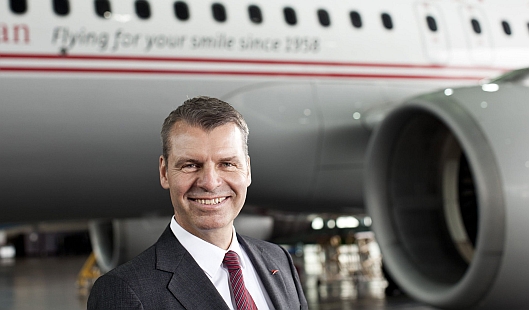
VISION AND HONEST DIALOGUE TO THE COMMON PURSUIT OF THE BEST SOLUTIONS,
HE WILL FIND WHAT HE SEEKS IN DIETER HALTMAYER. DR. ANDREAS OTTO
CHIEF COMMERCIAL OFFICER AUSTRIAN AIRLINES FORMER LUFTHANSA CARGO BOARD MEMBER
The Institute meticulously checks partner and customer references in advance of accrediting independent freight forwarders with Best in Class status. The quality of response that we received from the customer and partners of QCS was outstanding. Were it our intention to identify the one freight forwarder with the most outstanding reputation the institute would without hesitation bestow that honor on QCS.
“Relations between Lufthansa Cargo and Quick Cargo Service over these many years have developed very positively. In the meantime, both Iglu and QCS itself are to be found amongst the top 30 Lufthansa Cargo customers in Germany. And in addition to the positive commercial cooperation QCS has consistently distinguished itself as one of our best quality customers. At the yearly awards we present for input, quality, and digitalisation, QCS regularly takes a place on the podium. In their jubilee year 2014 they even managed to secure overall first place by winning both the Q- Award and the e-Award.”
FLORIAN PFAFF VP LUFTHANSA CARGO.
“Dieter Haltmayer’s creation of IGLU, which is an association of common interests in airfreight, was a masterpiece of an initiative where he saw the benefits of working together with other small to medium sized companies and being able to create volumes and thereby enhancing the negotiating power in competing with the larger multinational global players. This benefited not only his own company but the others in the industry. This shows his ability to realizing the changing needs to the time, his customers and partners. ”
RAM MENEN FORMER EMIRATES SKYCARGO
“The air cargo industry has a very bad habit of not giving the small and medium sized forwarder the respect they deserve. Many years ago I recognized that it is only through the personal service and dedication to customer satisfaction that forwarders like QCS bring to their clients that air cargo did not completely move to the integrators. It will always be true, that scheduled airlines owe a lot to people like Dieter and companies like QCS for having any chance to remain viable and credible with shippers and consignees.”
STAN WRAIGHT EXECUTIVE DIRECTOR STRATEGIC AVIATION SOLUTIONS
“QCS today is a premium brand, a globally active firm admired on all sides”
NILS HAUPT DIRECTOR CORPORATE COMMUNICATIONS HAPAG-LLOYD
“Whoever wishes to further his business and values A partner who brings vision and honest dialogue to the common pursuit of the best solutions, he will find what he seeks in Dieter Haltmayer. It is no exaggeration to say that without him Lufthansa cargo would be different in Germany today”
DR. ANDREAS OTTO CHIEF COMMERCIAL OFFICER AUSTRIAN AIRLINES
“Dieter Haltmayer is a convinced forwarder, a figurehead for the forwarding landscape in Germany He is quite simply a great person.”
ERWIN MARUHN EDITOR OF DVZ
ABOUT
INTRODUCTION
FREIGHT FORWARDING
AIR FREIGHTAt QCS we understand that air freight is a very expensive way for any company to move their product. We are acutely aware that when our customers need an airfreight solution that it must be fast, reliable and cost effective. That is why, in conjunction with our global partners, we only use the top tier airlines. This allows us to offer our clients a first class service while availing of extremely competitive negotiated rates. We proactively manage our client’s needs to achieve the best results and can handle any size shipments with ease. We can switch traffic between express, couriers or scheduled airlines or we can split shipments and manage them by air, by sea-air or by sea depending on shipment size and time constraints.
SEA FREIGHT
ROAD FREIGHT
CUSTOMS CLEARANCE
WAREHOUSING & DISTRIBUTION
LOGISTICS MANAGEMENT
PROJECT CARGO
CARGO INSURANCE
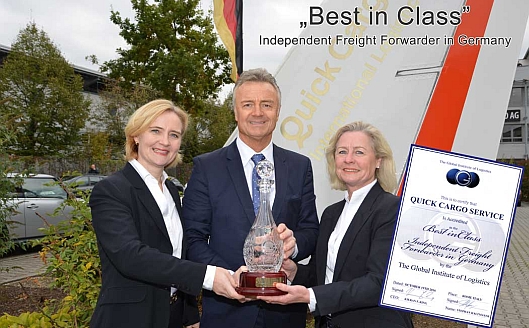
HEIDI HALTMAYER OPERATIONS DIRECTOR AT QCS HQ IN FRANKFURT
GIL: NETWORKING THE GLOBAL LOGISTICS INDUSTRY
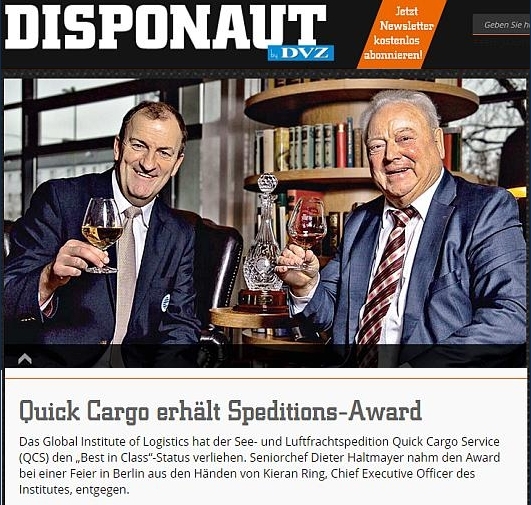
DISPONAUT Quick Cargo erhält Speditions-Award:
Das Global Institute of Logistics hat der See- und Luftfrachtspedition Quick Cargo Service (QCS) den „Best in Class“-Status verliehen. Seniorchef Dieter Haltmayer nahm den Award bei einer Feier in Berlin aus den Händen von Kieran Ring, Chief Executive Officer des Institutes, entgegen. Der heute 82-jährige Haltmayer hatte das in Mörfelden-Walldorf ansässige Unternehmen 1974 gegründet. Inzwischen stehen längst seine drei Kinder Stephan, Heidi und Jennifer an der Spitze des Mittelständlers.
CARGO FORWARDER GLOBAL QCS Rated Best in Class:
Forwarding agent Quick Cargo Service has been accredited as ‘Best in Class‘ from the Global Institute of Logistics (GIL) during a ceremony held in Berlin last Wednesday. It’s a knighthood for the family-run company’s outstanding performance over many years.
INTERNATIONAL TRANSPORT JOURNAL QCS is GIL’s “best in class”:
The Global Institute of Logistics (GIL) has accredited Quick Cargo Service Germany (QCS) with “best in class” status in recognition of the company’s outstanding contribution to the development of best practice in independent freight forwarding in Germany and beyond. QCS is the first independent freight forwarder to achieve this accreditation from GIL
RAM MENEN FORMER EMIRATES SKYCARGO Congratulations to the QCS team
“Congratulations to QCS was being awarded the best in class accolade. I am delighted to see that all the hard work and innovative platform that Dieter and his family have created are being recognized. It is easy to create a brand but a real challenge to sustain and grow it. They have done a great job on both counts. Congratulations to Dieter and the entire QCS team. This is well deserved.”
LINKS
HOMEPAGE IGLU
HOMEPAGE QUICK CARGO SERVICE
QCS TAKES IT ALL AT LUFTHANSA CARGO AWARD CEREMONY
THE QCS LUFTHANSA CARGO RELATIONSHIP
BERNHARD STOCK IS APPOINTED CHAIRMAN OF IGLU

